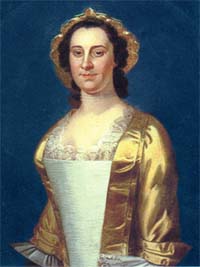["Family Memorials - A series of Genealogical and Biographical Monographs, on the families of ...,
Breese, ...", Edward Elbridge Salisbury, 1885]
In her early life my mother
manifested the same energy, fortitude and vivacity which distinguished
her to the end. Her sprightliness of mind, which was accompanied with a
certain natural pantomimic animation of manner, was doubtless inherited
from her maternal Huguenot ancestry.
The
homestead at Shrewsbury was, on one occasion, by her prompt and vigorous
efforts, saved from being burnt up -- she, with her own hand, lifting
buckets of water to the roof, which a servant brought from below, and
emptying them on the flames. She would sometimes lie side by side with
her deranged brother Samuel, while he held a pistol in his hand, in a
paroxysm of excitement, in order to soothe and quiet him, as she alone
had the power to do.
Her school-education was in Philadelphia, where she
made her home with her half-aunt Hazard; and she appears to have broken
loose from the necessary limitations of country-life by visits to her
sisters, already established in homes of their own. A desire to improve
her naturally strong mind and a thirst for knowledge were among her
earliest developed characteristics; and there is evidence that her
sprightliness of temperament and vivacity of manner made her, even in
her youth, a more than usually welcome guest, as they helped to make
her, in her mature years, and down to old age, a most agreeable hostess.
At one time, when she was visiting her sister Mrs Morse in
Charlestown, Mass., she joined a coterie of young people who frequently
met there for social intercourse, some of whom afterward became greatly
distinguished; of this number were the late Hon. Samuel Hoar of
Massachusetts, William Gotham, an eminent lawyer of the same State,
Ebenezer Rockwood, also of the legal profession, who died young, and
from whom the present Judge E. Rockwood Hoar takes his name, and Miss
Lydia Gorham, afterwards Mrs. Col. John Phillips, grandmother of Rev.
Dr. Phillips Brooks.
Here in Charlestown, too, or in the Boston society
into which she was introduced from here, she first met her future
husband. As a wife, she was devotedly affectionate, without, however,
losing her independence, or that power which her nature gave her to
strengthen, and to guide, by good counsels, the companion of her life;
and her feelings, in the marriage-relation, were reciprocated by
mingled deference and affection.
Her maternal sensibilities were uncommonly
strong: early left a widow, to touch her children, in any way, was to touch the apple
of her eye; and no sacrifice was too great which she thought to be needful to save them from the rough
winds of common experience, or to secure to them innocent pleasures and affluence of fortune.
If she erred at all, it was in allowing her apprehensions of evil for them to lead her to a course of too
great restraint upon their spontaneity of action, and to deprive them of the salutary lessons of accident, failure and hardship.
But her controlling motives were most unselfish, and it should be recorded here, to the praise of her maternal
love, as well as to the honor of her good judgement, that, having had given to her by my father's Will,
as we have seen, the virtual disposal of his entire property -- a handsome estate for fifty-eight years ago -- she
not only made over to each of her two children, on their coming of age, one-third of the whole, but more than quadrupled
the whole, in the course of her widowhood, to leave as a legacy from herself to her children and grandchildren.
The absoluteness of her devotion to her children may perhaps have given her, sometimes, in general society, the appearance of coldness and sterness;
and she could defend what she regarded as her rights, or rebuke what she viewed with disapproval in the conduct of others,
unhesitatingly and decisively. "Tall, stately and reserved" was a description given of her, which some who knew her only
slilghtly might think to be just; that was said, however, only from an exterior view; never was there a
warmer or tenderer heart than hers. Nor was it only as a mother that this showed itself to be true; she had attached
friends, of her youth as well as of her age; and many of her numerous nieces and nephews regarded her with grateful love and
respect -- as the correspondence she left behind her proves -- and cherishes her memory.
She had also, a mind and a heart to appreciate the calls of charity, public and private, outside of the bounds of
relationship. During the late civil war she was one of the most patriotic of her sex. Her fondness for reading, which has been alluded to
as a trait of her youth, was one solace and support of many lonely hours in her declining years; while Christian
hope, though not unfrequently smothered by a too great self-distrust,
shed light, continually brightening upon the whole, on her downward
path.
I have a photographic likeness of my mother, of about the year 1853, from a negative by Whipple of Boston,
Mass., finished with Indian ink: also a cut profile of 1804, copied for me through the kindness of Mrs.
Veitch, a daughter of the late Samuel Hazard, my mother's cousin, from an old album in her possession.
This album contains, besides, similar likenesses of my grandmother Breese and of my aunt Susan Bayard
(Breese) Snowden and her husband.





